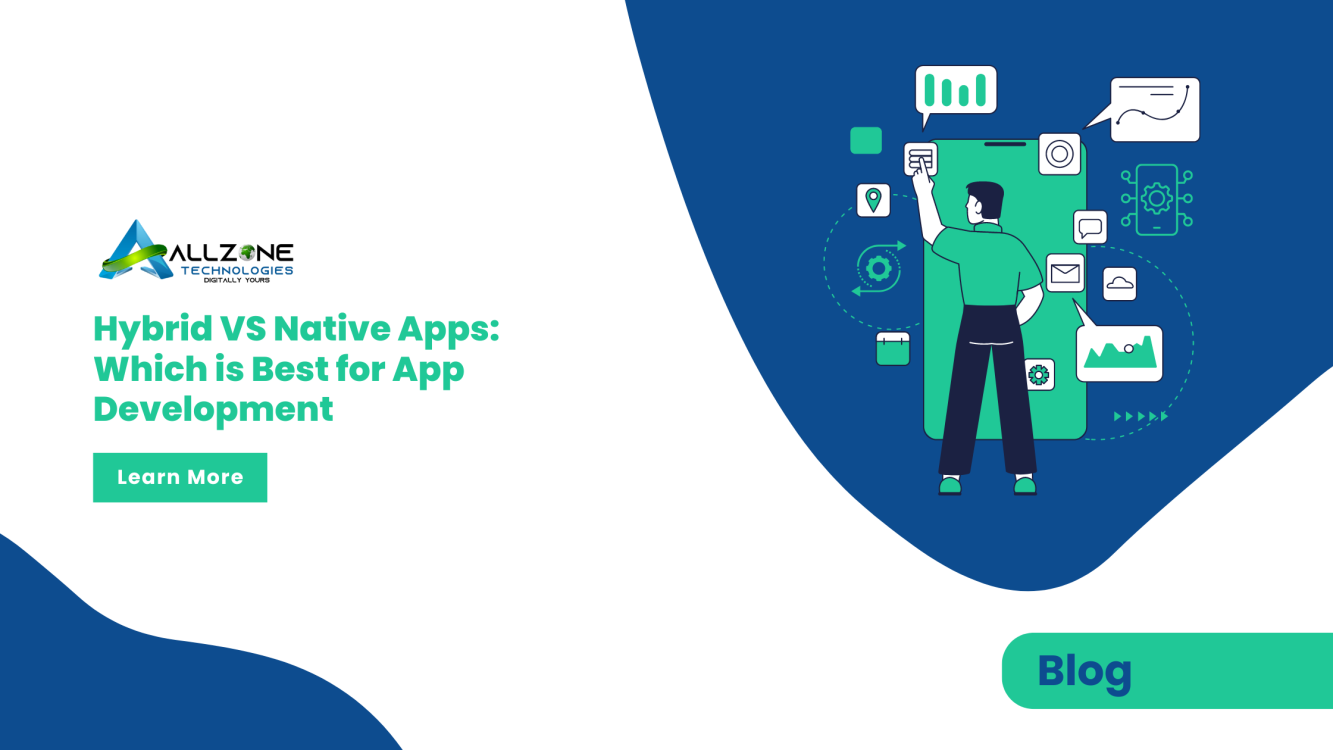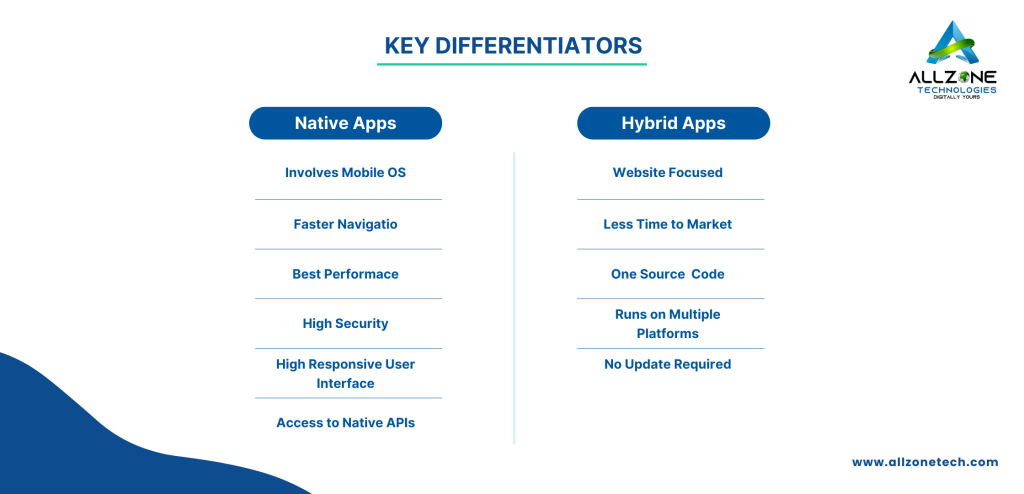
-
Muhammad Adnan
- August 21, 2024
Hybrid VS Native Apps: Which is Best for App Development
Mobile applications have changed the living standards of human beings. So, apps are dynamic tools. Users use them for their routine work, like shopping, grocery, banking, entertainment, and many more. Therefore, app development is one the rise, and businesses are choosing between the top technologies, like hybrid vs Native apps to develop dynamic tools for their business growth. People love to download mobile apps and today it is a whopping 299 billion.
Suppose you have decided to do a business having an exciting idea of developing mobile applications for your businesses. Seemingly, it is a cakewalk, but in reality, it is very challenging. Also, it requires professional skills, and experience to get the job done. Suppose you have to choose between Hybrid VS Native apps. There would be a question in your mind that would it be wise to develop a native app for one particular platform or develop a hybrid application? It is difficult to choose between the one because several factors are involved.
Let’s get to know the difference between Native vs hybrid apps. Moreover, could you get to know what approach is the best?
Native Apps In Nutshell
When it comes to Native app development you need to develop applications on certain programming languages and for particular OS of a mobile. So, Java for Android and Swift or Objective C for iOS. The application requires security to implement the technical side and guidelines of user experience of the respective operating system. It will empower the app with the best performance and user experience.
As we said earlier, experience means consistency in appearance and the display of other native apps on the device. In the end, users will get to know how to use the app to navigate the application. Apart from the pros, native apps also have cons that you need to know about. Users can easily get access and leverage the capabilities of the device, likewise, GPS, camera, address book, and many more. Native applications are native to the operating system. Hence, They demand a certain criteria.
Pros & Cons of Native Apps
Let’s get to know about the advantages of Native mobile apps as well as the cons. It will empower you to know what it really takes for native application development services to build an application for your businesses.
Pros of Native Applications
- Native apps resemble default OS apps, enhancing user experience.
- Faster loading due to platform-specific design.
- Improved graphics and image quality through aspect ratio maintenance.
- Reliable offline performance for core functions.
- Superior performance for graphic-intensive apps and animations.
The Power of Hybrid Apps: What Are They?
Native apps take longer to download due to the app store process.
App Development costs ultimate analysis are higher since different skills are needed for each platform.
Releasing the same feature across platforms is challenging due to unique codebases.
Top Examples of Native Apps
- Spotify
- SoundCloud
- Pokémon Go
- Tesla
The Power of Hybrid Apps: What Are They?
A hybrid app development company always focuses on developing outstanding native apps. Hybrid apps concentrate on the web. They appear as simple native applications, the actual source is the website of a company. Hybrid apps are basically web apps that develop through HTML, and JavaScript closed in a native app container. Once the users go through the app, it starts loading the data on that page.
Hybrid mobile apps are not typical web apps. They prefer to use native plugins to have functions without asking for further coding. It only requires a single build and empowers you to use native features of the device. It includes file storage, a camera, and security features. In order to get a broader side read ultimate hybrid app development guide.
Furthermore, hybrid app development cost is far less compared to the native apps. Because hybrid apps only require single code and use them anywhere.
Pros & Cons of Hybrid Applications
Hybrid apps, like native apps, have their own strengths and weaknesses. Let’s explore them:
Pros of Hybrid Apps
- Hybrid apps use a “one for all” build, saving time and money.
- Provide consistent user experiences across browsers, devices, and OS.
- Single code base allows developers to write once and run across platforms.
- Achieve hardware-based performance acceleration similar to native apps.
Cons of Hybrid Apps
- HD/3D games and data-heavy apps may struggle in hybrid form.
- User experience varies, necessitating extensive testing.
- Custom native plugins may be needed, adding development complexity.
Examples of Hybrid Applications
- Evernote
- Uber
- Teams
Hybrid VS NativeApps -What Sets Them Apart
Most of the users who download the apps from the Google Play Store or the App Store don’t know the difference between hybrid vs native apps. Well, it’s not their headache. All they need is the result which is the responsiveness of the application, either for Android or iOS.

The organization has only one goal which is the responsiveness of a site. It would become possible unless the organization knows the difference between native and hybrid apps to choose the best approach. Let’s take a look below to see the factors that unveil the top reasons to pick one or the other app development approach.
Access to Device
When it comes to device access, Native apps can easily get access to all device APIs via SDK. On the other hand, hybrid apps cannot get access to all APIs using the tool. It has limitations.
Development Expense
Native app development costs remain high because you have to develop applications for more than one platform. However, hybrid apps are less expensive because they can work on several platforms using a single code.
UI Consistency
Native applications come up with the kind of frameworks with genuine original UI components to have a native look. Hybrid apps also have relatively good UI if not that much up to the mark.
Programming tools
When it comes to Native app development, developers are more likely to use Java/Kotlin for Android. Moreover, Swift/Objective-C for the iOS platform. Hybrid application development prefers Flutter, React Native, NativeScript, and Xamarin.
Code Reuse
Native apps have to write code multiple times for each platform because its codebase on one platform will not work. Developers have to port the codebase of hybrid apps for multiple platforms.
Complexity of Application
As compared to hybrids, native programs are complex to develop. However, hybrid apps are simple or partially complex.
App Security
Native app development offers the highest security compared to hybrid apps. However, hybrid applications are less secure.
Hybrid vs Native Apps Performance Difference

When comparing Native vs hybrid apps, native apps are faster because they can work directly with the OS. However, hybrid apps use native wrappers which makes them slower. Therefore, hybrid apps have no comparison with native apps in terms of performance. Native applications are carefully designed which makes them faster. Once you navigate the content design and visual elements, it will not take time to load on your mobile device. Therefore, users will get an effortless experience.
On the other hand, hybrid apps use a wrapper that makes the hybrid apps lack navigation elements, Almost 90% of the data is loaded from the server. Two problems usually occur when it comes to the performance of an app: Server requests several users trying for the same server and load balance request. So, the performance of the hybrid applications starts lacking.
hybrid vs Native apps User Experience Difference

User experience is one of the most crucial pillars of an application. Mobile application development depends on the UX compared to the back hours. It is key to develop an application that does not give you a feeling of a new application. Difficult apps in terms of usage create frustration.
Keep in mind that users struggle with cell phones. Now, they can manage their devices, and most of the time they struggle with apps with unrealistic features. Users expect that the application should be interactive, visually appealing, and integrated with the platform style guide.
The user experience of a mobile application is crucial because if it is bad the user will not take time to bounce on another. Most of the users will not use the application again. Users will switch to another application that offers the same services but has a fascinating user experience. Being an organization ready to build a new app, the user experience of a particular application is crucial.
However, when releasing hybrid apps the platform has to be agnostic. A single code base is far easier to develop. It will also take less time to hit the market relative to the native apps.
How Much Time Hybrid Apps Vs Native App Would Take to Develop?

Companies take responsibility for custom application development stages. All they want to compete or there are chances that they have found business potential. However, higher authorities of the organizations want to launch the app as soon as possible. There are more chances that in a rush your project comes across many compromises. So, both approaches hybrid and native app development are useful for application development.
In such a situation where companies have enough time, like a few months to build, and launch an app, in this case, Native application development would be ideal. Native will offer better performance, and security for sure. Users will also have the best user experience. However, when a company has to launch an app in less time, like a week or so, hybrid mobile app development would be the best option. Hybrid requires single source code but you can release it across platforms. It also takes less time to develop to hit the market.
What Tech Stacks to Choose for Hybrid vs Native App
Enhance the performance of your app to have the best mobile app development picking the right tech stacks. Collection of tech stacks is crucial in terms of programming languages, databases, frameworks and many more. Because the wrong selection of the technology will create more complexities and unavoidable changes. Moreover, it will raise the app development cost to the next level.
Tech stacks for Native Application
Ready to know about the tech stacks you need for the development of Native application for android, and iOS app development. Let’s get to know in the following:
Native Android Apps
When it comes to custom Android app development, Kotlin, and Java are the best languages native application developers love to choose. Moreover, Android Studio and Android development tools are ideal for crafting code, testing, debugging, and so on.
Native iOS Apps
For Custom iOS App development, Objective-C, and Swift are the best programming languages. When you need to choose iOS native app development tools, Xcode, and Appcode are the best tools.
Stacks for Hybrid App Development
For hybrid app tech stacks, like HTML5, JavaScript, and CSS are best. Native, and backend shell create the majority of these apps. Frameworks, like Cordova, Sencha Touch 2, and Ionic are the best for hybrid app development. Hybrid app developers love to use these frameworks to build a hybrid application.
Native vs hybrid application Development
Mobile app development is time taking, and a resource incentive process. Therefore, investing your money in it demands a dedicated development team of developers. So, developing your dream product requires the following:
- Native app developer proficient in Objective C, Swift, Java, and Kotlin.
- Specializes in creating bug-free and visually appealing native apps.
- Requires multiple developers for creating native apps across different platforms.
- Hybrid app development expertise needed for integrating features like camera, push notifications, and GPS.
- Requires deep technical knowledge of various devices for effective hybrid app development.
- UI and UX skills such as information architecture, user persona, and wireframing are crucial for highly interactive interfaces.
Application Updates: Hybrid vs Native
A critical factor is the frequency at which developers want things to move to the production stage.It influences how you implement it and whether users need to take any action to notice those improvements.
- Hybrid apps do not require users to update through the app store.
- Users instantly see updates as they navigate through hybrid apps.
- Native mobile apps require users to update to view changes.
- Hybrid apps have an advantage over native apps in terms of instant updates.
When to Choose Native Apps:
Opt for native app development if:
- Your niche is highly competitive, and performance gains are critical.
- Your entire service revolves around mobile, or the app is intended to function as a standalone business.
- The app requires complex graphics, intricate designs, and interactions.
- Extensive functionality and complexity are essential.
- The app needs to operate offline, with plans for long-term scalability.
When to Choose Hybrid Apps:
Choose hybrid app development if:
- You need to quickly test and launch an app concept.
- You’re looking for a cost-effective, multi-platform solution.
- The app doesn’t require complex components or intricate logic.
- Your startup needs to develop an MVP rapidly.
- The app relies on downloading information from the Internet.
Wrapping it Up
Picking between hybrid vs native apps depends on your needs. Native apps provide performance security and complex functions. However, hybrid apps are cost-effective and take less time to developmentdevelop across platforms. Let’s evaluate your needs, and resources and be a partner with AllZone Technologies for your mobile app strategy.

